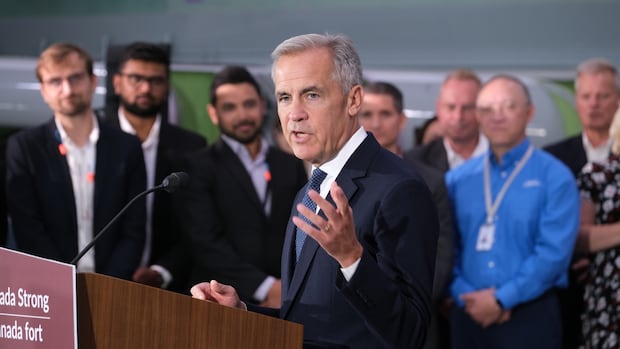Prime Minister Mark Carney unveiled a set of initiatives on Friday aimed at reshaping Canada’s economy to withstand the trade challenges posed by the Trump administration. The strategy focuses on assisting workers and businesses most affected by President Donald Trump’s trade policies and disruptions.
Speaking in Mississauga, Ont., Carney emphasized the need for immediate action and investment during challenging times to transition Canada’s economy from dependency to resilience and from uncertainty to prosperity. One significant aspect of the plan involves halting the electric vehicle (EV) mandate for the 2026 model year and initiating a 60-day review of the policy, responding to demands from the auto industry.
The EV mandate requires a gradual increase in zero-emission vehicle sales in Canada to meet emission-reduction targets. The government’s strategy, including the pause on the EV mandate, aims to equip workers with new skills, help businesses adapt, and stimulate domestic demand through a mix of loans, training programs, and policy adjustments.
Under the new measures, up to 50,000 workers will have access to a “reskilling package,” facilitating training opportunities through their employers or recruitment agencies. The government will automatically enroll new employment insurance claimants in a job-matching program while introducing a “skills-to-job” tool to streamline job searches and connect individuals to training and career guidance.
To support workers transitioning to new roles, the federal government is extending employment insurance benefits to 65 weeks for long-tenured workers and waiving the one-week waiting period for around 700,000 workers. Additionally, a $5-billion strategic response fund will aid businesses in product development and market expansion across various sectors affected by tariffs.
Carney emphasized a “Buy Canadian” policy to leverage government procurement in boosting domestic businesses for long-term economic growth. The government aims to maximize Canadian taxpayer dollars to support the local economy, replacing previous efforts with a clear obligation to prioritize Canadian suppliers.
Furthermore, to assist businesses struggling with the impact of U.S. tariffs, the government will increase the maximum loan size for small- and medium-sized enterprises and provide enhanced loan facilities for larger companies at lower interest rates. These immediate changes aim to help businesses adapt to the evolving trade environment.
In addition, the government plans to assist agricultural and seafood sectors affected by Chinese tariffs by introducing a biofuel production incentive and restructuring support. The upcoming changes to clean fuel regulations will foster a robust biofuels industry in Canada, accompanied by measures to enhance marketing and trade diversification for these sectors.
Conservative Leader Pierre Poilievre criticized Carney’s initiatives, describing them as a mere spectacle. Poilievre claimed that Carney’s efforts have not yielded tangible results and that negotiations with the Trump administration have not improved the country’s position.
Overall, the government’s multifaceted approach aims to support workers, businesses, and industries impacted by trade challenges, fostering economic resilience and prosperity for Canada.



